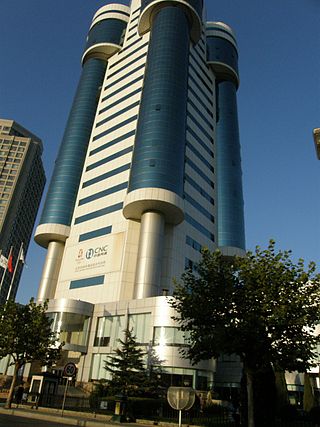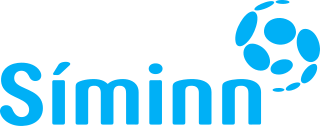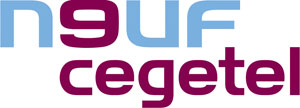The telecommunications and postal services market in Greece is regulated by the Hellenic Telecommunications and Post Commission (EETT).
Local loop unbundling is the regulatory process of allowing multiple telecommunications operators to use connections from the telephone exchange to the customer's premises. The physical wire connection between the local exchange and the customer is known as a "local loop", and is owned by the incumbent local exchange carrier. To increase competition, other providers are granted unbundled access.
Television broadcasting in Greece began in 1966, preceded in 1951 by statute 1963 permitting television broadcasting.

China Netcom, full name China Netcom Group Corporation Limited, abbreviated CNC, was a telecommunication service provider in People's Republic of China. It was formed in August 1999 by the Chinese government to enable inward investments to build high speed Internet communications in the country.

Hellenic Telecommunications Organisation S.A. is the largest technology company in Greece. It is one of the three largest companies listed in the Athens Stock Exchange, according to market capitalization.
A naked DSL, also known as standalone or dry loop DSL, is a digital subscriber line (DSL) without a PSTN service — or the associated dial tone. In other words, only a standalone DSL Internet service is provided on the local loop.

TelstraClear Limited was New Zealand's second-largest telecommunications company before being acquired by Vodafone New Zealand in October 2012, previous to which it was a subsidiary of Australian company Telstra.

Q-Telecom was the fourth mobile telephony provider in Greece. It began operation in June 2002. As of 2008, it called itself "Q" and called its services "MyQ." The company provided GSM phone service, supported by LMDS and backbone networks, and called itself the only complete and integrated telecom provider in Greece. In May 2007, it merged with WIND Hellas, which was known at the time as TIM Hellas.

Orcon Limited is a New Zealand telecommunications company. It is New Zealand's fourth largest Internet service provider (ISP). In 2013 it had a 5% share of the fixed line market.

Síminn hf., previously named Landssíminn and Póstur og Sími, is an Icelandic telecommunications company. It offers communication services for both private and corporate clients, including mobile (2G/3G/4G/5G), landline (VoIP/POTS), Internet (ADSL/VDSL/FTTH) and IPTV services. Síminn also operates multiple TV channels and streaming services. Síminn is listed on the Icelandic stock exchange.
Vodafone Greece is the Greek subsidiary of Vodafone Group. In 2004 it was the leading mobile operator in Greece. Its headquarters are in Chalandri - one of the northern suburbs of Athens.

Free S.A.S. is a French telecommunications company, subsidiary of Iliad S.A. that provides voice, video, data, and Internet telecommunications to consumers in France. Its head office is in the 8th arrondissement of Paris and it is the second-largest ISP in France.
In the telephony business, sub-loop unbundling (SLU) is a type of unbundled access whereby a sub-section of the local loop is unbundled. In practice this often means the competitor placing a small street cabinet with a DSLAM, next to a telco local copper aggregation cabinet or serving area interface and using a "tie cable" to connect to the last part of the local loop into customers' homes. Lyddington in Rutland was the first example of SLU in the UK when local provider Rutland Telecom unbundled the cabinet to offer VDSL broadband.

Neuf Cegetel was a French wireline telecommunications service provider and a mobile virtual network operator (MVNO). It offered various telecommunications services to consumers, enterprises and wholesale customers, ranking second in the country in annual revenues. It was legally established in 2005 following the completion of the merger between Neuf Telecom and Cegetel. As of June 2008, the company became a wholly owned subsidiary of SFR, and the brand disappeared commercially.
Internet access is widely available in New Zealand, with 94% of New Zealanders having access to the internet as of January 2021. It first became accessible to university students in the country in 1989. As of June 2018, there are 1,867,000 broadband connections, of which 1,524,000 are residential and 361,000 are business or government.
Internet in France has been available to the general public since 1994, but widespread Internet use did not take off until the mid-2000s. As of 31 December 2014, France had 26 million Internet broadband and high-speed connections on fixed networks. In 2014, 80.7% of French households had Internet access, while 19.3% did not.
Internet in Greece reached an 82% usage rate among individuals in 2022, yet it slightly trails behind the European Union averages in digital skills among individuals aged 16-74, as highlighted in the European Commission's Digital Decade Country Report 2023. In an effort to bridge this gap and enhance digital proficiency across the nation, Greece implemented the "Works Again" law in April 2022. This law is designed to modernize the Public Employment Service, aligning it more closely with the demands of the labor market and vocational training needs. Additionally, Greece has launched a strategic initiative for Vocational Education and Training (VET) and lifelong learning. This initiative aims to revamp educational curricula to include digital and green skills.
Telecommunications in Cyprus includes radio, television, fixed and mobile telephones, and the Internet, in the Republic of Cyprus.

The Greek Internet Exchange (GR-IX) is an Internet exchange point located in Athens and Thessaloniki in Greece. It was founded in 2009 in order to replace the Athens Internet Exchange as the principal Internet Exchange Point in Greece, which was achieved in January 2010. GR-IX is non-profit, independent and is supervised by the Greek Research and Technology Network (GRNET). GR-IX is a member of the European Internet Exchange Association.
Chorus is a provider of telecommunications infrastructure throughout New Zealand. It is listed on the NZX stock exchange and is in the NZX 50 Index. The company owns the majority of telephone lines and exchange equipment in New Zealand; and was responsible for building approximately 70% of the country's fibre-optic UFB network, receiving a government subsidy of $929 million to do so.









